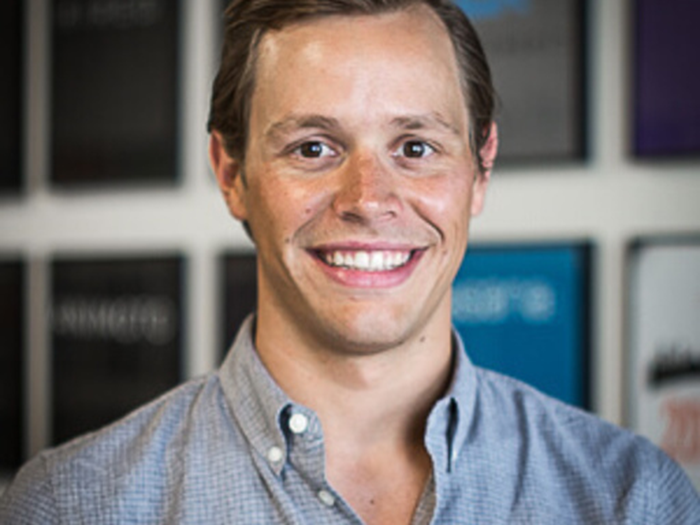10 Questions for Andrew Wynn, Founder and Co-CEO of Ascend

This fall, Risk & Insurance editor-in-chief Dan Reynolds caught up with Andrew Wynn, founder and co-CEO of Ascend. What follows is a transcript of that discussion, edited for length and clarity.
Risk & Insurance: You’ve worked in a variety of startups in different sectors. What was it about the commercial insurance agency sector or space that got your imagination going?
Andrew Wynn: It’s really the idea that technology can complement these important industries that are the cornerstones of the world in which we live. A company like Instacart didn’t want to come in and put the grocery store in your small town out of business; they wanted to help expand that. We saw the same thing with insurance. This is a critical part of our financial system but it’s more a critical part of the communities in which it operates and protects.
So the question is, how can we actually help those businesses sustain for another 20, 50, 100 years by leveraging technology and not coming in and replacing them? I’m from a pretty small town in Indiana. My high school best friend’s dad ran an insurance agency — this sort of classic Main Street, couple offices, sponsored T-ball and the like. I wanted to do something in my work that I could connect with and had a sort of tying those things together.
I didn’t grow up in New York City and want to just go work in finance or something like that. I wanted to connect to the point of how our childhoods impact us today. Maybe that’s my flaw, but I wanted to do something that felt connective, and I just saw how important those businesses are in the community and so wanted to work in a way that engaged that aspect.
R&I: We talked earlier about the pressures that wholesalers or retail brokers might face. What are the pain points, Andrew, that you think you can address in their operations?
AW: I think the main point or summary is help them improve their efficiency with technology. I know that’s a very broad statement. The way we do that is by automating administrative processes that are typically non-revenue-generating and costly, specifically the financial or accounting operations that happen inside of these Main Street or Wall Street insurance agencies.
They’re all fundamentally the same. People are handling accounts receivable, they’re handling invoicing, they’re handling accounts payable, they’re handling reconciliation, and they’re doing it manually.
That adds a drag to their business when really what they want to be doing is selling, in the case of distribution of what we talked about, and underwriting in the case of carriers. So, in a big business where it is a huge enterprise, they might have a whole group of folks dedicated to doing that.
But in your average Main Street America business, whether it’s a 10-person shop or a $10 million revenue shop, often those burdens fall to the people who are involved in production or management and they really do cause a drag on the business.
When I think about this, one of the first people I talked to when we were starting Ascend was my friend’s dad, the insurance agent. Some of these tasks are not what he wants to be doing. It prevents the business being the business that it can be for him, his employees and the community.
R&I: I think the serious talent issue that insurance is facing is worth bringing up. Insurance is not alone in facing this, but we talked about increased efficiencies, the use of technology and how the younger, newer generation of agents and underwriters might be more comfortable with technology. Does that resonate with you?
AW: That’s really important in keeping the industry in the place it needs to be. It is important. How do we keep it important? Technology is important to this new generation and we have to meet them there.
R&I: Would an MGA or a wholesaler need more help in this area than a retail broker?
AW: It really depends on their lines of business. I think we see a lot of MGAs and wholesalers coming to us now because they don’t have the technology; historically, they’ve done it manually. They don’t have the infrastructure to offer direct bill. It exists in personal lines. If you’re a homeowner’s Florida MGA, you probably have direct bill, but if you’re a commercial auto MGA, for example, you probably don’t.
As a result, all of those retailers who are selling your products, who are working with motor carriers, truckers all day have to take on that burden of calling the trucker who’s on the road.
You can’t just mail them a bill — they’re out and about collecting that payment and following up with them, making sure they went through it, dealing with the payment if there’s an endorsement because they got a new truck, whatever.
A lot of those retailers are saying, “Hey, we would prefer to do business with an MGA or broker who handles this administrative burden for us because it’s really costly and we don’t have the time to do it, and it’s not in our wheelhouse.”
So, we do see a good amount of demand from MGAs and wholesalers who want to not just automate their financial operations but also extend the capability of them.
R&I: They’re expanding their services to their partners if they have this capability.
AW: Exactly. I think there’s a little bit of a mindset around that. Historically, I think, it was a little bit of passing the buck as we thought about, how do we provide more? Who does what? One of the beauties of technology is it doesn’t really matter.
No one is going to take on an increased burden. A computer is going to do it, and we all win. And so folks who adopt that mindset or see that mindset of, “Hey, I can support direct bill, not because I’m going to go hire 10 people to invoice and pay commissions to retailers but because I’m going to get a computer program to do it.” Those are the folks who we’re seeing really sort of win.
R&I: Can you describe for our readers, how does what you’ve built work? What does it do?
AW: For the retail side, we essentially do financial operations. Automation is what we describe it as. What that means is we essentially, at the end of the day, automate the transactional ARs and APs.
So for a retailer specifically in commercial, where there’s heavy agency bill for example, we’ll essentially take the data from the agency management system or system of record and we’ll use that to create an invoice.
We’ll go and collect that invoice from the insured, and we’ll offer the insured a range of transactional methods. So if they want to use a credit card, ACH, wire, check, installments, financing or whatever it is, there will be no extra burden for the retailer to have this menu of options.
We then handle that payment on behalf of the retailer. Then, once that payment comes through, that’s the receivable side. We also handle the accounting and accounts payable side.
So what that means is we automatically net out that retailer’s commission and move it to their operating bank account; we create a payable and automatically fund that payable to the billing company, the broker, the MGA, the carrier, and then we reconcile that back into their agency management system.
While all of this happens, they sell the policy and they get their commission and everything else needed to transact that is done by us. Historically, that’s been done by people. That’s one example of what we do for agencies.
R&I: What are the leaders of agencies or distribution partners telling you? What kind of feedback are you getting from them?
AW: We’re getting positive feedback for a couple of reasons. One is, this typically has been seen as a drag. People don’t get into the distribution world because they love being bill collectors. They do it because they like selling insurance or they like working with their community and risk management. So it gets rid of something for them that they don’t really want to own in-house — that’s number one.
Number two, it allows them and their staff to focus more on the things that are their core competency, risk management, and not things that are critical to the business — like getting paid — but don’t need to be their core competency.
That actually rolls down to their bottom line. It allows them to improve their revenue, improve their earnings, because now, not only are they not paying people to do these administrative tasks, but to the point we were talking about earlier, often this is done by folks on the production side.
There’s an opportunity cost to every minute spent not selling. So we’re reducing the expense that they’re spending and allowing them to reinvest that time into production and revenue generation.
R&I: I’m sure you know as well as we do there are so many different businesses within insurance. We’re talking about distribution, we’re talking about underwriters, but there are pharmacy benefit managers, there are third-party administrators, there are medical bill review folks. Are you envisioning taking what you’ve built into these different pieces? Or do you think you’ll stick with distribution and underwriting?
AW: I think long-term what we aim to be at Ascend is the financial infrastructure of insurance. So in an overly simplified way, I’ll just use this example: Dollars and insurance move in a loop.
We’ll take the agency bill example, since that’s what we’ve been talking about. Insured pays retailer, retailer pays MGA. MGA pays carrier. Carrier pays a claim. There’s lots of other stuff that goes on in there, but it moves in a loop, or it can move the other way.
Insured pays carrier, carrier pays commission. But there are these simultaneous loops always running, and all of those systems are disparate. And as a result, all of those points of contact create friction, and friction is being dealt with by people today.
With Ascend, what we really want to do is vertically integrate that across the industry so that the funds flow in an efficient manner and the necessary accounting work, reconciliation, moving money, handling refunds, endorsements, taxes and fees is actually all done automatically.
We want to be both the software layer that says “Yes, this is the ledger, this is what’s moving in and out,” as well as actually moving that money as well. Longer-term, we really want to vertically integrate the industry and we think that will create a ton of value across the industry — not just for distribution, not just for underwriting.
R&I: You did talk earlier, on a personal level, about why you engage with this, why it’s important to you. I’ll ask the question slightly differently. When you see the feedback that you’re getting and you put energy and effort into this, into building this, what’s your personal reaction to that when you see it working, when you get that good feedback? What does that do for you?
AW: I think we collectively take a lot of pride — and I can speak for myself, but also the team. because we have folks who share in this in creating real value, and in a way that impacts the lives of people who we’re working with. There’s a business to be built here, no doubt. We like that. What we really care about, though — and I mean we care about both — but what we also care about, which maybe not everyone does, is how this is impacting the lives of the people that we’re working with in a positive or negative way.
I’ll be really candid: Sometimes we go into an agency or a carrier and we’ll talk to someone whose job this is and they say, “No, I do the checks. I open the things and I reconcile.” So that’s also real feedback that we balance. Just as often, there are folks who are aging out of the industry, where they say, “Yeah, I’m the controller. I’m retiring at the end of the year. They better not call me in January.”
We see that, and that touches on the talent issue we talked about earlier. Conversely, we care a lot about when we’re able to get that positive feedback from our customers. That’s something we look at all day, every day. Every employee at Ascend — whether they’re a salesperson, someone who works in customer support or someone who’s a software engineer — goes and visits agencies a few times a year just to get a sense of who these people really are.
R&I: Was there anything on your mind when you were thinking about talking to us that I didn’t ask you about that you wanted to express?
AW: I see this through the lens of billing and payments and how money flows, but I think that’s a theme that we hear across everything — how data is shared, how policies are shared. So I think everyone understands that there’s a benefit of connectivity and data-sharing and integration, and we just want to be a part of that as it relates to the financial aspect of insurance. &










